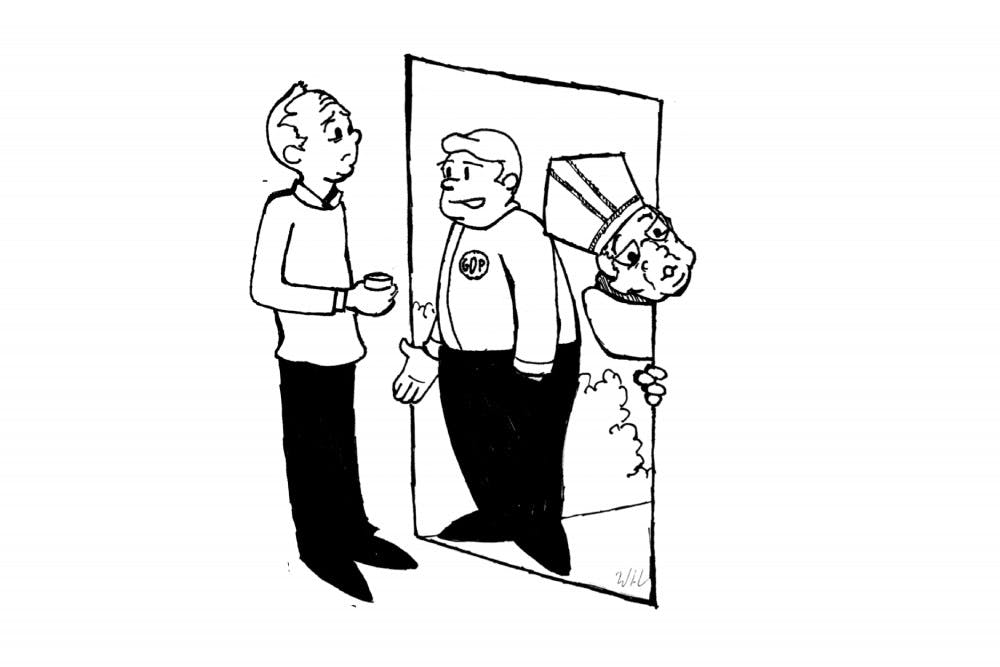There is much hypocrisy in politics, but after the midterm elections last week, one point bothers me more than ever: the glaring contradiction between Republicans’ founding mantra and their current values.
In its 2012 platform, the GOP reaffirms its support for small government. It states, “This platform affirms that America has always been a place of grand dreams and even grander realities; and so it will be again, if we return government to its proper role, making it smaller ... If we keep taxation, litigation, and regulation to a minimum.”
While the platform names small government as an ideal, Republican policies around gay marriage and abortion say otherwise. You know all that jazz about individual freedom? Yeah, yeah, yeah — it’s great, but it can go on the back burner for those issues.
So what is going on? The short answer: a merger of religion and politics.
Before the 1970s, Republicans recruited from a small pool — mainly White Anglo Saxon Protestants. The tone shifted with Richard Nixon, however, when he hardened his stance on abortion so as to entice blue-collar, catholic workers to the GOP. Soon after, Evangelicals and Catholics teamed up to man the Moral Majority, a political organization that worked with the Republican Party and opposed issues like abortion and gay rights.
Thus, the GOP slowly incorporated faith into its policies, contextualizing the hypocritical nature we see today, most notably in the Tea Party.
According to 2010 Pew Research Center data, 88 percent of Tea Party voters prefer small government (compared to 56 percent of all registered voters). 64 percent of Tea Party voters oppose same-sex marriage (compared to 49 percent of all registered voters) and 59 percent of Tea Party voters believe that abortion should be illegal in all/most cases (compared to 42 percent of all registered voters). About half of Tea Party supporters said that their religious beliefs (mainly evangelical and catholic) were the most important influence on their views of gay marriage and abortion.
With the Tea Party playing an increasingly large role in American politics, these opinions are significant. In total, there are an estimated 513,702 members registered with the Tea Party, and in the 2010 midterms the Tea Party made up 41 percent of the electorate, 86 percent of whom voted for Republican House candidates.
All that makes me wonder about voters who are not Tea Party Republicans, but moderate Republicans instead. We hear it all the time — those people who claim to be “liberal on social issues, but fiscally conservative.” They voted for Mitt Romney because they agreed with his economic policy, but don’t get them wrong, they support gay marriage and/or abortion rights!
While I do not doubt these folks, I have to challenge them. They might support small government when it comes to the economy, but they have to realize that with the bond between the GOP and these religious groups, the other 75 percent of their vote is going towards hypocritical (and in my opinion harmful) action on social issues. A vote for Mitt Romney didn’t just mean lowering taxes; it meant halting gay rights and limiting abortion access too.
For some people, the current Republican combo might be a win-win — those who support laissez-faire economic policy and also oppose gay marriage and abortion (whether it be from religion or not). For others, however, it is more of a zero-sum game when they vote Republican — they totally sacrifice their interests in social issues to achieve their ideal fiscal code. My points are that 1. Being Republican was not always this way — it was the marriage of faith and the GOP that made it so, and 2. What is given up in the zero-sum game, social justice, is significant. Voters need to take these two points into account before elections; doing so will keep them clear-minded, a much-needed trait when it comes to today’s national politics.
Artwork by WIN HOMER




